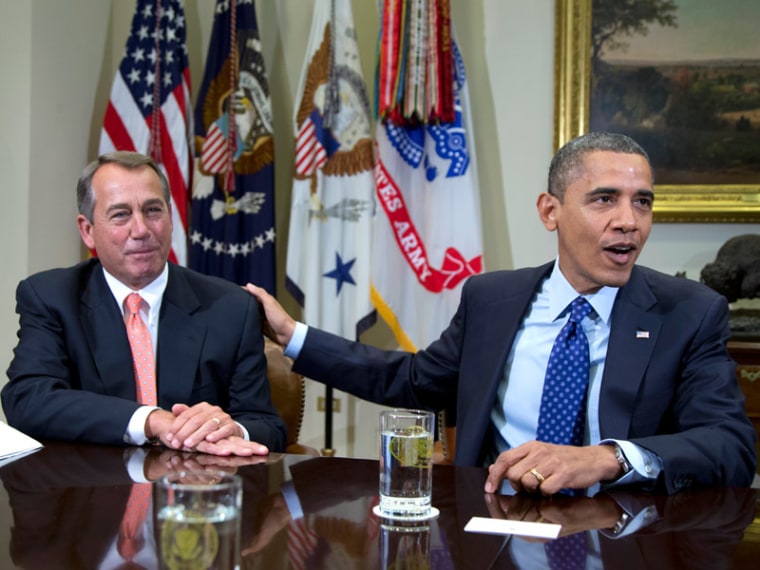"[T]he truth of the matter is that the problem in Congress is very specific. We have a group of folks in the Republican Party who have taken over who are so ideologically rigid, who are so committed to an economic theory that says if folks at the top do very well then everybody else is somehow going to do well; who deny the science of climate change; who don't think making investments in early childhood education makes sense; who have repeatedly blocked raising a minimum wage so if you work full-time in this country you're not living in poverty; who scoff at the notion that we might have a problem with women not getting paid for doing the same work that men are doing. [...] "[T]he problem ... is not that the Democrats are overly ideological -- because the truth of the matter is, is that the Democrats in Congress have consistently been willing to compromise and reach out to the other side. There are no radical proposals coming out from the left."
Obama: 'The problem in Congress is very specific'
The president went further than usual last night in shining a light on basic structural truths that challenge widely held assumptions about what's wrong with DC

In these contentious, divisive times, Americans may not agree on much, but if approval ratings are any indication, there's something approaching a consensus about Congress and policymaking in Washington: it's broken.
The contention may be rooted in fact, but it is incomplete. At a fundraising event last night, President Obama went further than usual in shining a light on basic structural truths that challenge widely held assumptions.
The substance of this is hard to deny. The president argued, accurately, that on the major issues of the day, Democrats deliberately pursued moderate solutions to pressing problems. On immigration, Obama's proposal enjoys bipartisan support and is similar to what Bush/Cheney recommended. On climate, Democrats could have adopted a command-and-control model, but Obama instead endorsed a cap-and-trade plan comparable to what McCain/Palin proposed.
On taxes, Democrats have pushed for modest reforms that would leave tax rates broadly lower than when Reagan was in office. Even on health care, the Affordable Care Act is a centrist solution built on Mitt Romney's model. It led the president to add:
"So when you hear a false equivalence that somehow, well, Congress is just broken, it's not true. What's broken right now is a Republican Party that repeatedly says no to proven, time-tested strategies to grow the economy, create more jobs, ensure fairness, open up opportunity to all people."
To be sure, hearing the president specifically call out "false equivalence" is sure to make some Beltway pundits uncomfortable.
But as Greg Sargent explained, the president's willingness to make these arguments publicly is important: "I'm not sure Obama has ever gone so directly at the idea that today's GOP has become what some of us have been calling 'post-policy'; that the basic imbalance resulting from that is the primary cause of reigning Washington dysfunction; and that on a fundamental level, press coverage is failing to reckon with these realities."
There are those who choose not to believe this. Many in the Beltway -- perhaps out of habit, perhaps out of laziness, perhaps out of blind adherence to a misguided ideology that dictates "both sides" are always to blame, facts be damned -- prefer to believe that if radicalized congressional Republicans refuse to govern, Obama must somehow be responsible.
Maybe, they argue, if Obama was a more leading leader, the president could force extremists in a separate party and a separate branch of government to bend to his will. To deny this, they argue, is to make "excuses."
But to approach the political landscape with maturity is to appreciate institutional realities. And in this case, the reality is, the president's assessment of what's ailing Congress rings true.